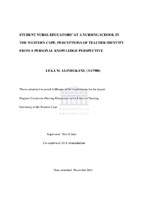| dc.description.abstract | Teacher identity is regarded as an important disposition when it comes to training would-be teachers, irrespective of the field of study. It is during the teaching practice experience that student nurse-educators transit from their preconceived identity as a student to accepting the teacher identity. It is expected that for student to acquire this identify they require profound knowledge in subject content, pedagogy and didactic knowledge, so as to perform their professions effectively. Although the focus of teaching is the student teachers, attention is sometimes focused more on the nursing facilitators rather than on the nursing student teachers who are becoming teachers. However, good nursing training should also take into consideration the perceptions of nurse student teachers on the teacher identity. This study sought to describe student nurse-educators’ perception of teacher identity with respect to the subject matter, pedagogy, and didactic expertise at a School of Nursing, University of the Western Cape. The quantitative research approach, using the descriptive design was employed to guide the study. Data was collected by means of a self-administered questionnaire using a five point Likert scale. A list of students in master’s education programme was utilised as the sampling frame. The sample included the Masters students in nursing education programme who have completed their theoretical courses and teaching practice. The Statistical Package for Social Science software (SPSS) version 22 was used in the analysis of the survey. The study showed that teacher identity of student nurse-educators is strongly related to their perceived level of knowledge of expertise in subject matter (34%) followed by a grasp in didactics (33.28%). Teacher identity was less perceived in mastering knowledge related to pedagogy (33.12%). While the average median were 3.50 for subject matter, 3.54 in didactics and 3.50 for pedagogy. The relation between knowledge of expertise in subject matter, pedagogy and didactics were established after performing Kendall tau-c test. The link between gender and subject matter, pedagogy and didactics revealed no significant association. No significant difference was found between males and females respondents perceptions with regards to subject matter and didactics; while significant difference was found with didactics. The findings make a contribution to the body of knowledge in the nursing education field, and could contribute to improve the competency and quality in the practice of nursing education. With regards to the speculation on identity formation and development issues, it is hoped these findings will provide greater understanding of the difficulties student nurse-educators experience as they construct individual identities as teacher. | en_US |

